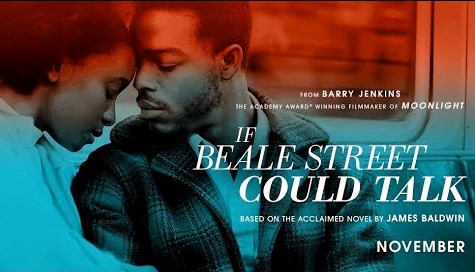
The romantic love swoons mighty and rapturously in the opening minutes of If Beale Street Could Talk, an adaptation of the 1974 James Baldwin novel that is one of the best films of the year. Tish and Fonny have known each other since childhood, and the love and friendship carries into their teen years. Racism has always damned black communities, but Tish (Kiki Layne) and Fonny (Stephan James) in their early years seem unaffected by it. They have an ardor that is untarnished, a willpower that is undeterred, a faith in the world that everything will turn out alright.
The primal injustice is that Fonny is incarcerated for a rape that he was nowhere near, arrested by a corrupt cop and picked haphazardly out of a police lineup. Tish and family will do whatever it takes to get a white lawyer on their side to clear his name, but the case becomes daunting when the accuser moves from New York back to her roots in Puerto Rico. The accuser is also a hysterics case, and Tish’s mother (Regina King), has to be forceful and ingratiating with this Puerto Rico woman when she gets her big scene to persuade her to come back to the States and help Fonny.
This is the first film by Barry Jenkins since directing the Oscar-winning “Moonlight,” and it’s clear now he’s a visual poet (and yes, this is the better of his two films). He slides back and forth in time but effortlessly, and in time we see the bigger picture that this is a briefly lived love story that is surrounded by turmoil and injustice. The sadness of the film really hits you. Yet there are so many riveting scenes of suspense, such as Tish’s fear in how she will announce that she’s going to have Fonny’s baby, even though he’s in prison. Or how, in a flashback, they seem at odds of moving into their first apartment together, a little skittish about why the landlord is being so nice to them when they know they are trapped in a racist society.
“I hope that nobody has ever had to look at anybody they love through glass,” Tish says in narration. The prison scenes are limited only to the glass divider visitation scenes between Tish and Fonny, and Jenkins seems to say great volumes just in the way he directs the actors in those scenes – the terrible wear of prison life is reflected into the face of Fonny, then later, some resignation to the life as a convict.
There are deliberate things left out of the movie, that may frustrate us as much as they haunt us. We meet the cop responsible for doing Fonny in, but we don’t see how he led the arrest. That’s one of a few elements, where something is said but not entirely shown. “If Beale Street Could Talk” is a tragedy, and some of the tragedy is not getting full closure. Yet this film poetically connects in more ways then one. But starting with one and two, there’s a radiance in the eyes of these characters, and the emotions within them glow just the same.
117 Minutes. Rated R.
DRAMA / CINEMA ART LOVERS / VIEWING IN THE DARK
Film Cousins: “Moonlight” (2016); “I Am Not Your Negro” (2016); “Detroit” (2017); “The Hate U Give” (2018).





